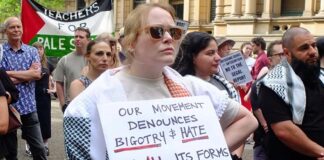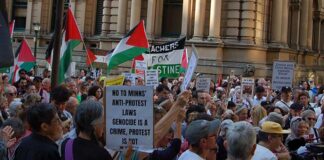Boat turnback commander promoted to Defence Chief
Operation Sovereign Borders (OSB) Commander Angus Campbell has been promoted to Chief of the Defence Force. Campbell’s track record of anti-refugee cruelty helped score him the promotion and its outrageous $800,000 a year salary.
As OSB Commander Campbell was in charge of “stopping the boats” and turning back refugees to danger. He notoriously helped to protect the secrecy of the government’s turn-backs by refusing to comment “in relation to on-water matters”. In practice turn-backs meant violently cramming refugees into unsafe boats with no food or water and pushing them back towards Indonesia.
Turnbull poured praise on his new appointment, gushing about the “enormous trust and confidence” he has in Campbell. He was disgracefully echoed by Bill Shorten who welcomed Campbell’s “well-deserved appointment”.
BP: oil spill would boost economy
Oil and gas giant BP argued that an oil spill in the Great Australian Bight would be economically beneficial to the local community as part of its bid to drill in a sensitive marine zone.
BP’s plan to drill two wells off the South Australian coast raised fears of a potential disaster on the scale of the 2010 Deepwater Horizon oil spill in the Gulf of Mexico. Documents obtained under freedom of information laws show that BP claimed that if such a disaster occurred, “in most instances, the increased activity associated with clean-up operations will be a welcome boost to local economies”.
The statement was made in a March 2016 environment plan submitted to the National Offshore Petroleum Safety and Environmental Management Authority. The submission also said in regards to the environmental catastrophe of a large-scale diesel spill, “BP interprets this event to be socially acceptable”.
Rich Australians have biggest welfare bill
Welfare for the wealthy represents the biggest slice of the government’s welfare spending, a report commissioned by Anglicare Australia has found.
The Cost of Privilege report shows that an immense $68 billion is spent every year on hand-outs to the rich. The cost vastly outstrips that of Newstart, disability support or the age pension.
Tax exemptions on private education and healthcare cost upwards of $3 billion per year. Capital Gains Tax exemptions cost $40 billion and superannuation concessions cost $20 billion per year.
In contrast the cost of Newstart comes in at just $11 billion a year. The report uses model households to illustrate its findings. A couple with two kids in private school, first class private health insurance and two investment properties will get $99,708 in concessions from the taxpayer, or $1917 per week. This is more than twice as much as a family with two kids on Newstart.
Goldman Sachs asks if curing patients a sustainable business
Multinational investment bank Goldman Sachs—Malcolm Turnbull’s former employer—has lamented the fact that curing patients is unprofitable for biotech companies. Its 10 April report titled “The Genome Revolution” asks “Is curing patients a sustainable business model?”
Considering the potential commercial impact of new “one shot cure” gene therapies Analyst Salveen Richter writes: “While this proposition carries tremendous value for patients and society, it could represent a challenge for genome medicine developers looking for sustained cash flow.”
Richter uses hepatitis C treatments developed by Gilead Sciences as a case in point. Cure rates of more than 90 per cent have shrunk the company’s sales for the treatment from $16 billion in 2015 to what is estimated to be less than $5.1 billion this year.
He said, “In the case of infectious diseases such as hepatitis C, curing existing patients also decreases the number of carriers able to transmit the virus to new patients, thus the incident pool also declines… Where an incident pool remains stable (eg, in cancer) the potential for a cure poses less risk to the sustainability of a franchise.”
International students living in library
In March Charles Stuart University’s Port Macquarie campus evicted six international students found living in a 24-hour library. The students had to travel from Sydney to Port Macquarie to study and were unable to find accommodation.
Arjun Mathilakath Madathil, of the Council of International Students Australia, said he had heard many similar stories. “Some students stay at hostels or AirBnbs when they first get here”, he told the ABC, “but once that is done, they become homeless and they feel safer to stay on campus, or in a campus library”.
He said international students were often targeted by housing scams where they pay money and are promised a house on arrival in Australia, but once they arrive, “they realise there’s nothing there, the room or house doesn’t exist.”
1 per cent to own two-thirds of wealth by 2030
A report by the House of Commons library, the research arm of the British parliament, has found the richest 1 per cent of the world’s population will own two-thirds of global wealth by 2030. They currently own around 50 per cent but their share is set to keep increasing, according to the research. Based on current trends by 2030 the total net worth of the 1 per cent will be $391 trillion, more than double the $180 trillion they control now.
$90 billion lost to gas companies
Australia would be $90 billion better off, had it adopted European-style taxes on oil and gas production. Carlos Boué, of the Oxford Institute for Energy Studies, found our effective tax rate on oil and gas was 21 per cent, compared to 35 per cent in Denmark, the Netherlands, Norway and Germany.





